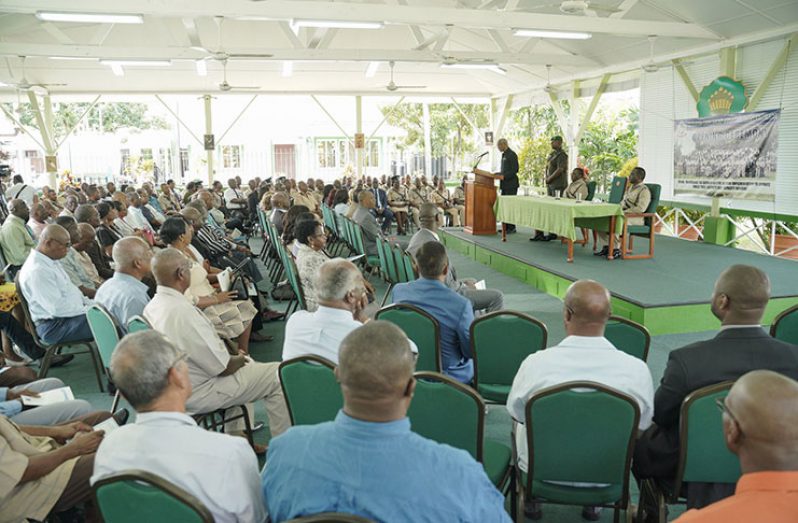– Commander-in-Chief
ACKNOWLEDGING an influx of Venezuelan migrants to Guyana and cross-border threats, the Tactical Services Unit (TSU) of the Guyana Police Force will have expanded responsibilities to protect the country’s border ‘frontline’ communities.
This is according to Commander-in-Chief, President David Granger, during his feature address on Thursday at the opening of Police Force’s Annual Officers’ Conference.
The opening of the three-day event was held on Thursday at State House, under the theme “Maintaining the Security Sector Reform Implementation to enhance public trust, security and capacity building.”
The President explained that in light of migration from regional and neighbouring countries, there are now more Venezuelan migrants in the country than there are police officers in the force.
“They continue to face criminal threats, particularly from contraband, human, gun and narcotics trafficking mainly in the hinterland. The Internal Security Squad will continue to be based at Eve Leary and will be trained to perform its current functions, mainly on the coastland. So there will be two squads, a hinterland squad and the coastland squad,” the President said.
He explained that security threats are becoming complex and more formidable along with transnational threats and inter-personal violence has been the cause of many crimes and has inflicted a huge human cost on the population.
“Guyana must be secured against local and transnational crime and our families and school children must be secured from interpersonal violence. Our environment must be protected to ensure that our natural resources are not plundered. Communities must become free from criminal violence. Children must be allowed to grow up in safe and secure homes, schools and neighbourhoods,” the President said.
Adding that an efficient, well-equipped, well-trained and professional police force is needed to confront these threats to human safety and public order, the President said the force is required to protect the country and its economy.
“Farmers want to protect their crops from larceny; ranchers want to bring an end to cattle rustling; fisher folk want protection from piracy; miners want to be safe from attacks on mining camps by bandits, particularly from ‘sindicatos’ operating along the country’s frontiers; loggers want safety within their concessions and businessmen want an end to burglary,” the Commander-in-chief said.
He noted that the country’s geographic, demographic and economic factors place a heavy burden, historically, on the force’s organisational, operational and administrative capabilities. The force is overcoming these challenges.
“Guyana, although small compared to the other states of South America, is the largest country in the Caribbean Community. It has a 260 km coastline and 3,000 km land borders. Its variegated landscape includes grasslands, highlands, islands, wetlands, the flat coastland, hinterland rainforests, rivers, lakes and waterfalls. All of these present challenges for law enforcement officers,” he said.
The President added, “access to nearly 75 per cent of our country, which is covered with forests, is difficult for the police, a situation which is compounded by inadequate infrastructure such as aerodromes, bridges, highways and stellings.”
The vast areas, long distances and limited communications and transportation assets available to the police force restrict its ability to enforce the law everywhere, effectively, he said.
Many communities are accessible only by air; others can be reached only by river; others are best accessed on horseback, by all-terrain-vehicle or bicycle or on foot.
Further, the President explained that the distribution of the country’s population also presents challenges to effective policing.
He said more than 80 per cent of the country’s population resides on the coastland, with the remaining 20 per cent scattered in numerous small communities, which are often separated by great distances and often too small to justify a permanent police presence.



.jpg)











